See Dissecting Deism Past and Present
The English Deists: Thomas Hobbes
Thomas Hobbes (5 April 1588 - 4 December 1679) was an English philosopher, whose famous 1651 book Leviathan established the foundation for most of Western political philosophy from the perspective of social contract theory.
Rejection of theological supernaturalism stands out as
the most conspicuous characteristic in Hobbes's philosophical writings (d.
1679), which were inspired by the teachings of the new mathematical and natural
sciences.
The different religions are explained as the product of human fear
interpreting natural phenomena in anthropomorphic form, or, in their higher
aspects, as the outcome of reflection on causal relation in the universe.
Miracles and revelations are in themselves improbable, and may be most easily
explained as the imaginings of the ignorant.
Positive religion is the creation of the State, and the sovereign justly possesses unconditional power to enforce its prescriptions, for only in this way can religious strife be avoided. Between religion thus naturally explained and a prophetic and Christian revelation Hobbes, nevertheless, attempted to mediate; he mentions as the means that might lead to such a reconciliation the rational interpretation of miracles, the differentiation between the inner moral sense of Scripture and mere figurative expression, and the historical criticisms of Biblical sources.
The entire apparatus of Rationalism is here to be found, limited only in its application. Further, Spinoza's Tractatus theologico-politicus (1670) and Bayle's Dictionnaire (1695-97) were effective in shaping the character of Deism. Of no small importance, also, was the rise of a literature of comparative religion and the publication of ethnographical studies and works of travel.
China, Arabia, Egypt, Persia, India, and primal regions, were brought within the
horizon of religious investigation. Philosophy, beginning with Locke's theory of
knowledge, and natural science, with Newton's theory of gravitation, contributed
to the opposition with which theological dogma was confronted.
Yet their
attitude was not one of hostility to religions which they sought rather to
utilize for the purpose of establishing the desired universal standard of truth.
Newton and Boyle succeeded in reconciling the creed of the Church with their
mechanical metaphysics; and this union remained characteristic of England, so
that even men like Priestley and Hartley did not shrink from supporting their
materialistic theories by theological arguments.
We have here the blending of a sensualistic epistemology, a mechanical-teleological metaphysics, a historical criticism, and an a prioristic ethics whose product in the shape of natural religion was destined first to undermine Christianity, then to compete with it, and finally to supplant it. Ref. IEP.
The English Deists Morgan, Annet, Middleton
Thomas Morgan (d. 1743) continued Tindal's
argument on its historical side in The Moral Philosopher
(1737-40),displaying much originality in tracing the development of heathen
religions, as well as of Judaism and Christianity.
Abandoning the old method of
deriving specific religions from priestly deception, he explains their rise
through the gradual supplanting of the one God of the law of nature by a crowd
of divinities connected with definite natural phenomena.
The legislation of
Moses, under Egyptian influences, imposed a rigid and nationally restricted form
upon the lex naturae, and the Jewish ritual and ceremonial is in essence
a purely political institution.
Full revelation of the law of nature came with Christ, who gave to the world in concentrated form the truth that had already been revealed to Confucius, Zoroaster, Socrates, and Plato. The protagonist of this divinely revealed truth after Christ was Paul, who, in his form of expression, indeed, was compelled to make concessions to the influence of Judaism, and in whom, therefore, much is to be taken figuratively. Peter, on the other hand, and the author of the Apocalypse misunderstood the import of the revelation of Christ and corrupted it in the spirit of Messianic Judaism.
Persecution forced the two tendencies into union in the Catholic Church, and the Reformation has only partially succeeded in separating them. Morgan's argument results, therefore, in the rejection of the formerly assumed identity between the law of Moses and the lex naturm, and the restriction of the latter, in the fullness of revelation, to Christianity. His conclusions were denied by William Warburton in The Divine Legation of Moses (1738-41).
When the
Christian apologists substituted for the argument from miracles the argument
from personal witness and the credibility of Biblical evidence, Peter Annet (d.
1769), in his Resurrection of Jesus (1744), assailed the validity of such
evidence, and first advanced the hypothesis of the illusory. death of Jesus,
suggesting also that possibly Paul should be regarded as the founder of a new
religion.
In Supernaturals Examined (1747) Annet roundly denies the
possibility of miracles. Conyers Middleton (d. 1750) in his later writings
sought to bridge over the gulf between sacred and profane history, and to test
them equally by the same method.
His Inquiry into the Miraculous Powers
(1748) demonstrates that the belief in miracles is common to primitive
Christianity and heathen creeds, and that it developed to great proportions in
the later life of the Church, so that one is then confronted with an endless
succession of miracle to which belongs the same degree of credibility that the
apologists attributed to the miracles of the Bible.
Though special reference to
the New Testament was omitted, Middleton propounded a question to answer which
no serious attempt was mad when he asked why credence should be granted to one
faith that is denied to another. Ref. IEP.
- Islam Versus Deism
- Left vs Right, Montesquieu, Corporatism
- Eastern Roman Empire and Islam
- Philosophies of Islam, Greece, and the West by Turgut Ozal
- Example of Islam and science.
- Maimonides Versus Aristotle and the Jews of Spain, Thirteen Rules
- Handbook on the History of Modern Science
- Pelagius and why he was right
- Islam Versus Judaism and Christianity
- Islam to Deism: Why I became a Deist
Web site Copyright Lewis Loflin, All rights reserved.
If using this material on another site, please provide a link back to my site.

